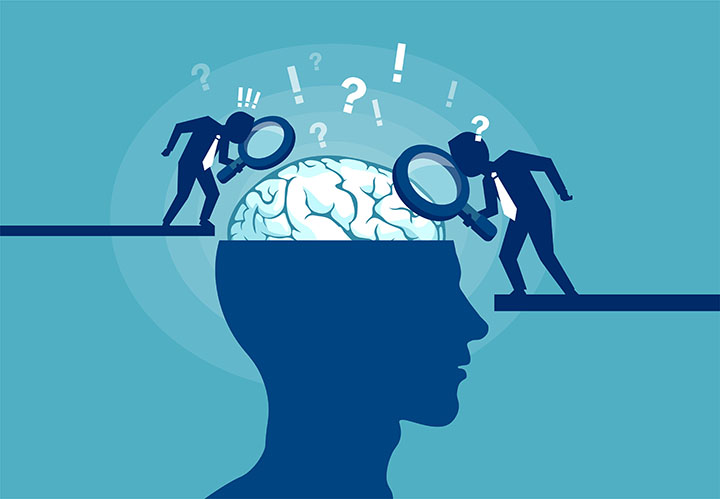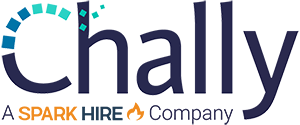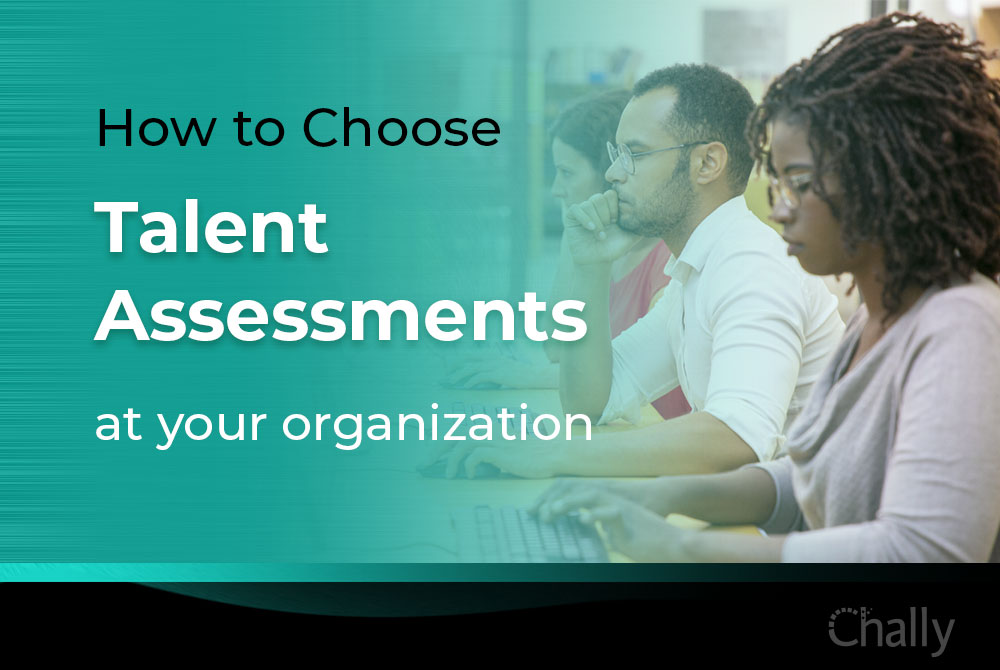How to Choose and Use Talent Assessments at Your Organization
Talent assessments are an excellent tool for recruitment, hiring, or identifying coaching and development opportunities. But, with thousands of options available, it might not be clear which assessment is suitable for your organization.
Choosing the right candidate can be easier and more effective with talent analytics, whether sorting through hundreds of new candidate applications or re-evaluating a merging workforce during an acquisition. Talent assessment tools can help by putting the most qualified and engaged candidates at the top of your list – and on the path to success with professional development.
Find out if Chally’s Talent Assessment Tools are right for you. Learn what makes Chally different.
How to Assess Talent Potential (and Why)
There are countless traditional methods for assessing talent potential, from preliminary interviews and personality assessments to skill and talent-based assessments. These can give managers insight into how a candidate fits into your organization. In addition, they can further develop your team and find knowledge gaps within the organization.
Top reasons for assessing talent:
- Empower Decisions With Data. The Information provided through assessments leads to informed, data-driven decisions. Focus on a candidate’s knowledge, abilities, and strengths rather than resumes, diplomas, or unconscious biases.
- Gauge Talent Gaps. Predictive assessments can also be powerful tools for evaluating your entire talent pool, particularly during times of change like layoffs, mergers, and acquisitions.
- Reduce Time-to-Hire. The data provided through talent evaluations leads to stronger alignment between candidates and job roles. Knowing your candidate meets the qualifications and skills you’re looking for means less time between extending a job offer and the candidate accepting it.
- Increase Employee Retention. One of the primary causes of performer turnover is poor job fit. Business Insider found that one-third of employees quit because they felt they could not grow their skills or career in their current roles. Talent assessment and development ensure the right people are being hired and promoted.
Creating a talent assessment strategy will help you know your organizational needs deeper, with more meaningful information. Interviews and meetings can only tell you so much about a person, especially when anxiety or self-doubt get the best of us. A talent assessment process provides a greater chance of learning more about your candidate’s abilities they may not even be aware of.
What is a Talent Assessment?
A talent assessment is a short objective evaluation that helps employers match job roles with qualified candidates. Custom tests can concentrate on various qualities and characteristics such as work styles, skills, knowledge, or broad personality traits. Employee talent assessment tests may include hypothetical scenarios, word matching, puzzles, or broad-spectrum questions.
Common organizational uses for talent assessments:
- Candidate evaluation and hiring decision making
- Talent management during mergers and acquisitions
- Ongoing professional development and coaching
Recruiting and hiring managers can use talent assessments for external hires and existing team members who may be ready for a new role. Or managers can use them to guide employee coaching.
Are Talent Assessments Accurate?
There has been debate over the validity of talent assessments as they become increasingly popular in the hiring process. Some believe that personality assessments are easy to manipulate, thus making cognitive assessments more valid. However, this is untrue, and when companies carefully select the personality assessments to use, they will gain valuable insight to hiring and developing their team.
When used within the limits of their design, valid assessments are remarkably efficient and cost-effective tools that improve the accuracy in employee selection, can address inequality in hiring and promotion decisions, and support individual and group professional development programs. Most notably, predictive assessments can accurately provide information about a candidate’s ability to be successful in their role.
What is a Recruiting Assessment?
Pre-employment assessment tools can highlight the candidates in your recruitment pipeline that are ready for more in-depth interviews. Bringing these assessment tools into the hiring process either as part of the application process or after preliminary formal interviews can quicken the hiring process through data-driven decision-making.
What do candidates think of pre-hire tests? There are hundreds of assessment methods for hiring. Talent assessments can vary in length, but a recent study by Gartner found that candidates most trust assessments that they can complete within ten to thirty minutes. It can also improve their experience in the hiring process and encourage feeling more connected to the organization.

Assessment Methods for Hiring
Assessment methods for hiring might vary depending on your organization or industry. However, with a clear vision of what you and the company need in a candidate, an organizational talent assessment can narrow the list of candidates qualified to meet your needs.
- Predictive Talent Assessments: Predictive hire online assessments gauge a candidate’s potential to perform the tasks required of a specific role. These tests can identify job fit or spot leadership potential during company transformations. Example: Chally’s Predictive Talent Assessment
- Predictive Engagement Assessments. These are the best candidate assessment tools for evaluating candidates’ likelihood of being engaged on the job. One of the leading factors of employee turnover is poor job fit. Predictive engagement assessments reduce that risk by providing insight before hiring an employee – to know if they will enjoy their new position. Example: Chally’s Predictive Engagement Assessment
- Personality Style Indicators. Results from personality quizzes and more robust style instruments can help you understand what your team members enjoy about their role and what motivates them. You won’t necessarily know from these types of assessments if they will succeed in their position but you can learn about motivations and habits. Examples: MBTI, Workplace DISC Test, Enneagram
- Demonstrated Skills Assessments: These types of assessments measure if a candidate has the skills and knowledge to perform the job to the company’s expectations. Examples: Tests for Computer Programming, Typing, Driving, Numeracy
What About Talent Acquisition Assessments?
Talent acquisition assessment tools can measure employees’ success, engagement, or talent fit during the transformative times of company mergers and acquisitions. In these situations, predictive assessments help evaluate organizational capacity and engagement as teams merge, informing more equitable talent management decisions.
Talent Assessment for Existing Employees
Gathering good data makes it possible to explore and answer questions about your team and their performance. For current employees, talent analytics tools and other online assessments can clarify who is capable and ready for a new role in the organization. Regularly, they can be a foundation for talent reviews, coaching, and succession planning.
How to Choose Talent Assessment Tools
Once you’re ready to bring talent assessment tools into your hiring process, you must know the many options and possibilities of these tests. With hundreds to choose from, you’ll want to consider a few factors to know which assessments align with your company and goals best.
Validity
Describe the factor to consider for choosing a talent assessment tool. Why should this factor be considered? Emphasize the importance of this factor and how it can benefit the company if regarded. Validity is the extent to which a test measures what it claims to measure.
A test must be valid to apply and interpret the results accurately. There are three approaches to generating evidence of validity:
- Content Validity. The extent to which a tool or measure assesses all critical facets of a job (tasks, duties, required knowledge, skills, and abilities). A sub-category would be face validity, in which a test looks like it measures what it’s intended to measure.
- Criterion-related Validity. A test is said to have criterion-related validity when it has demonstrated its effectiveness in predicting a criterion, such as success in a role measured by quota attainment. The two criterion-related validity types include concurrent (when measures are obtained as the test is taken) and predictive (measures are obtained after the test).
- Construct Validity. This validity applies when there is an association between the test scores and the prediction of a theoretical trait.
Costs
The high cost of open positions and high turnover make talent assessments a savvy HR investment. Unfortunately, talent screening is costly and time-consuming. Practical talent assessments will expedite the hiring process and ensure your top performers are engaged and on the right track.
Adverse Impact
Adverse impact is when a decision disproportionately impacts a protected group – even unintentionally. Protected groups in the United States include those of a specific race, gender, sexual orientation, age, or other members that fall under the Equal Employment Opportunity law.
Employment opportunity equity is an important consideration when determining the best assessment tools for hiring. Beyond meeting Equal Employment Opportunity compliance regulations, companies that prioritize diversity and equity are more likely to have a greater amount of candidates applying for roles, and lower employee turnover.
Diverse thought leads to better strategies, new ideas, and greater employees satisfaction as people are willing to work hard and advocate for companies where they feel seen, valued, and respected.

How to Start Conducting Talent Assessments At Your Company
Incorporating talent assessments into the recruitment and hiring process requires planning and support from your team and the company. Without a proper plan to execute any changes, you likely won’t have candidates applying that are qualified for the roles you’re looking to fill.
The steps listed below provide clarity from beginning to end so that you can feel confident with how to start conducting talent assessments at your company.
- Know Your Company’s Needs. Understanding this means aligning with hiring managers and department leaders to know what positions need filling.
- Choose Your Assessment Methods. As mentioned, there are different types of assessments, such as cognitive, predictive, or skills-based. Assessing candidates can include in-person or video interviews, work samples, or simulations. Depending on your organization, some of these assessments will be more relevant than others.
- Track and Measure Results. With any new project or approach, you want to measure tangible KPIs to see if the changes are effective. Many assessment tools include reports and actionable insights to help understand how these assessments are completed.
- Use Predictive Analytics. Assessment tools are one piece of a giant puzzle for the hiring team. Use tools to highlight the types of individuals applying for roles and find who is more likely to succeed.
Challenges of Talent Management Assessment Tools
Talent management assessment tools deliver deep insights you can’t necessarily reach through interviews or resumes. Though this information helps teams hire quicker with better candidates for specific positions, it can be challenging to implement a new strategy.
Fortunately, there are solutions to the most common challenges companies face when considering using talent management assessments.
- Cost: The costs associated with talent screening and hiring can add up quickly. For some companies, the money spent on talent management assessments can seem too great. However, the money saved by streamlined hiring processes, decreasing employee turnover and improving job fit create exponential value. Hiring the right person for the appropriate role can save thousands of dollars.
- Company Perception From Candidates. It seems unlikely, but some companies worry about how candidates will perceive them if they require talent assessments in the hiring process. Studies have shown that most candidates appreciate companies that ask for assessments (so long as they only take between ten and thirty minutes). Candidates value showing off skills to set them apart. Even if they don’t make it to the next round of the process, they will have some clarity that the role wasn’t the best fit for them.
- Using the Information Effectively: Information is mighty, but only as much as you know how to use it. Analyzing and using the information obtained in assessments will take time and practice. Fortunately, many assessment tools will come with the assistance of a team or agent to help you navigate all the information you learn about your candidates.
Advantages of an Effective Talent Assessment Strategy
Incorporating an effective talent assessment strategy into your hiring process creates new pathways to success for members of your organization across multiple levels. Managers, department heads, or organizations set goals that are easier to achieve when the right people are in the best-suited role for their skillset. Multiple factors, including talent assessments, supply an edge to this process.
- Fill open positions faster: The insights gained through talent assessments enable quicker filtering of qualified or unqualified candidates for available roles.
- Broader talent pool: Talent assessments help avoid implicit bias during hiring for a larger talent pool of more qualified candidates with fresh ideas from all backgrounds.
- Improved job fit: Candidates who complete assessments favorably are more capable of fulfilling the role’s requirements.
- Greater employee satisfaction: Similar to improved job fit, employees want to do the job you hired them to do. Knowing they have the right fit will lead to personal fulfillment that their career is on the right trajectory for short and long-term goals.

Read more about how Chally helps business improves hiring decision with objective evidence.
Start Talent Assessment and Development with Chally
Using talent management assessment tools can lead to stronger candidates matching opportunities that align their career goals with their skill sets. The process can also reduce friction in the hiring and onboarding processes for managers.
Incorporating talent assessment tools into your hiring process may seem confusing when choosing between predicted talent, personality traits, developed skills, or engagement assessments. However, finding quality candidates for open positions is easier with these assessments; you can find stronger job fit and satisfaction amongst your new hires.
With over 400 studies proving our methods’ validity and reliability, Chally can help you find appropriate assessments to make the hiring process more precise, streamlined, and accurate. Find top-quality candidates to onboard and enable your organization to continue to grow with our Predictive Talent Assessment or Predictive Engagement Assessment.
Explore more related articles:


